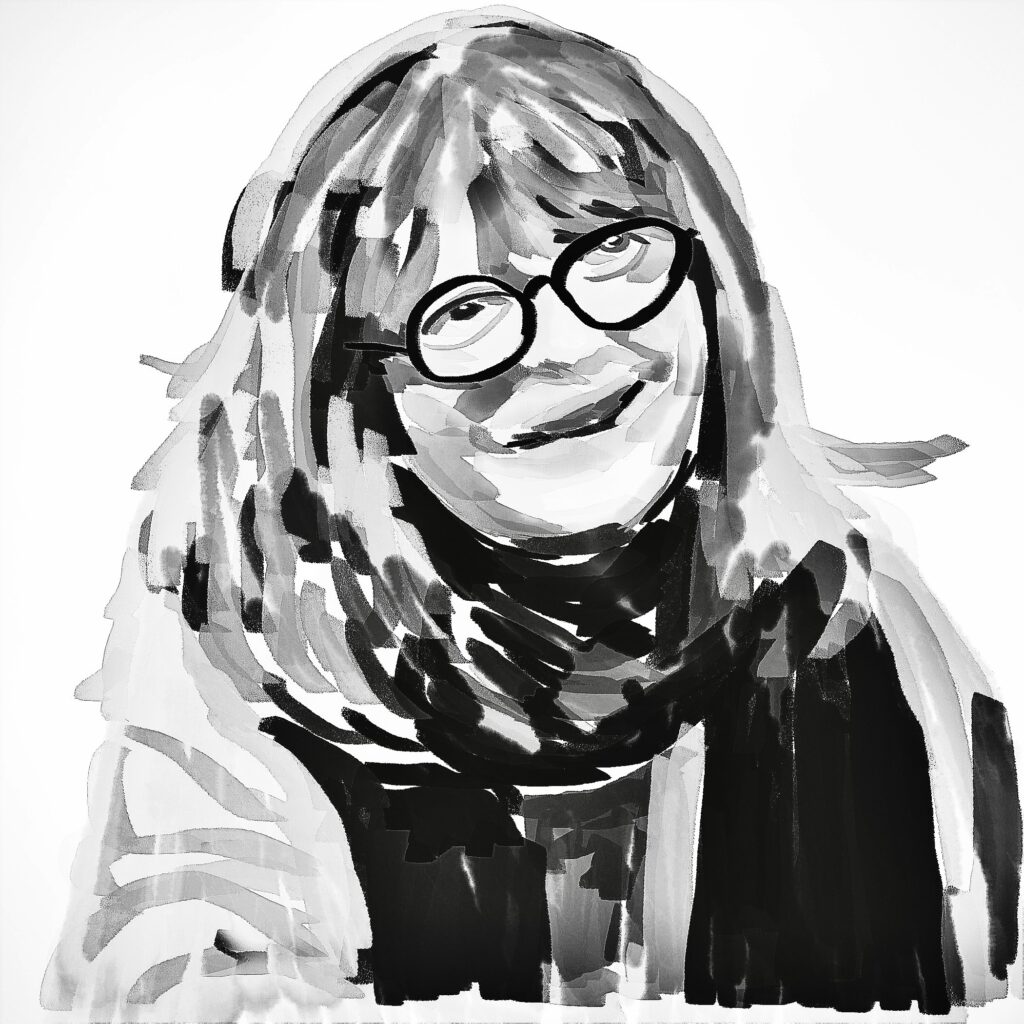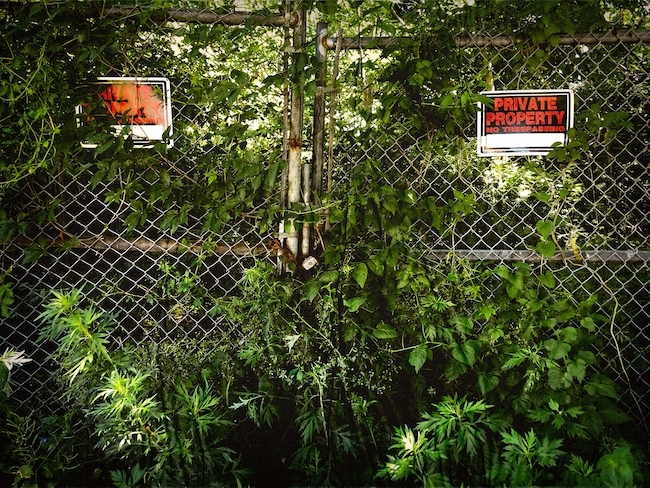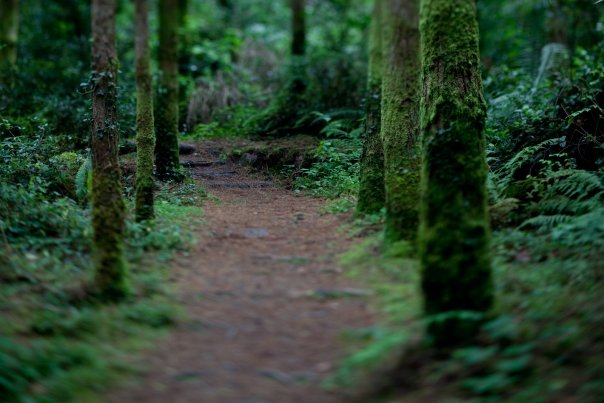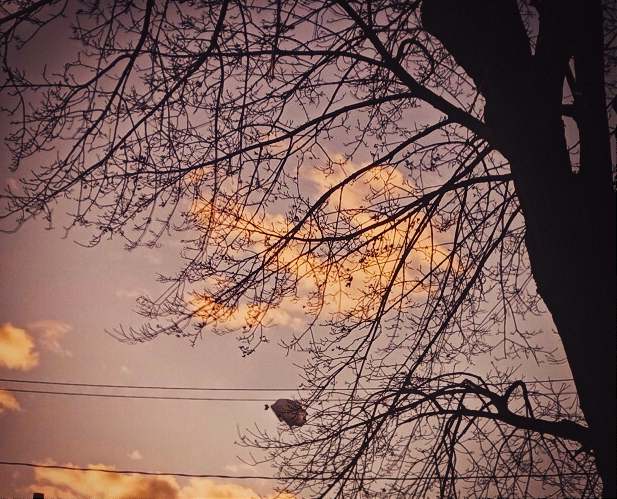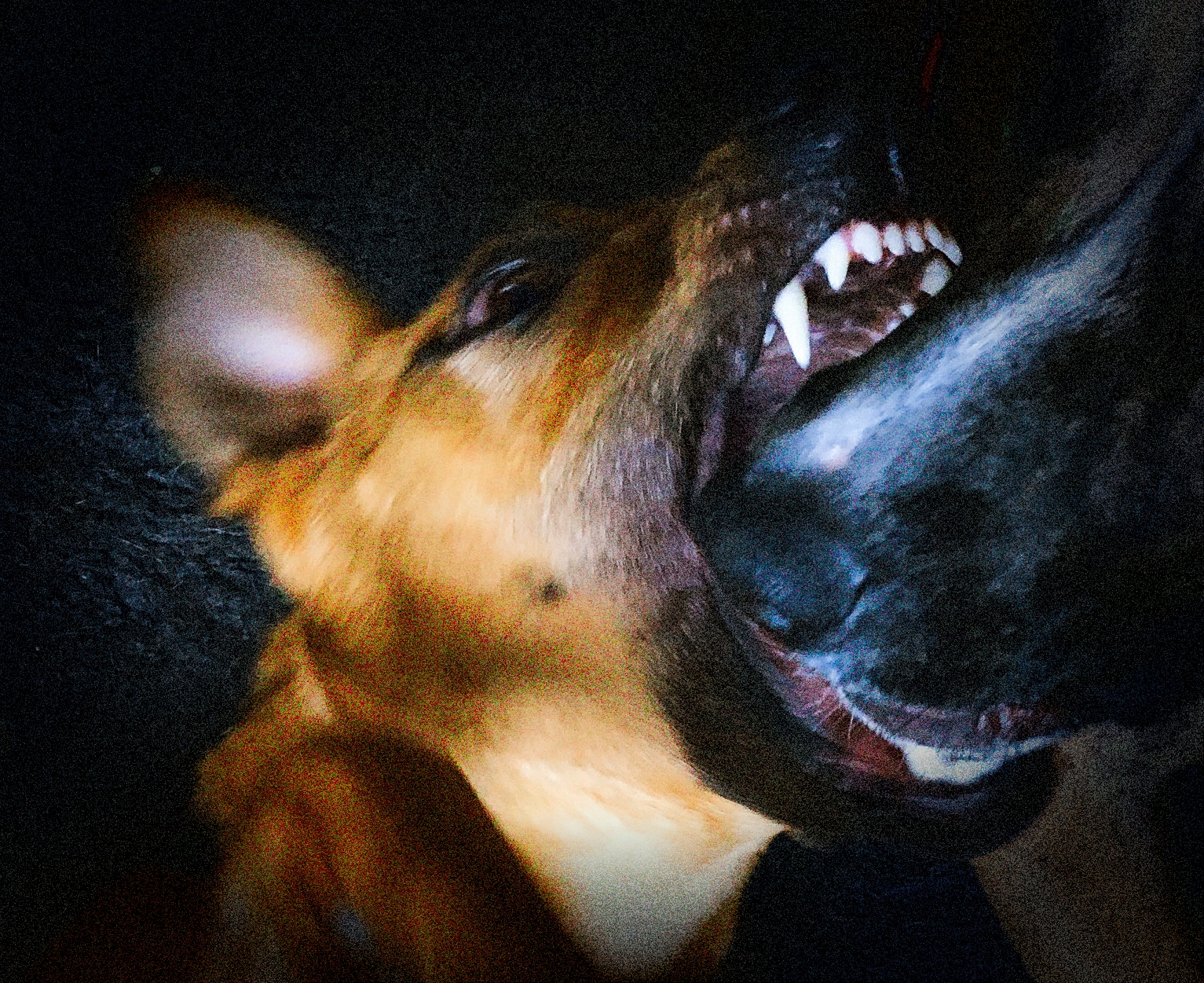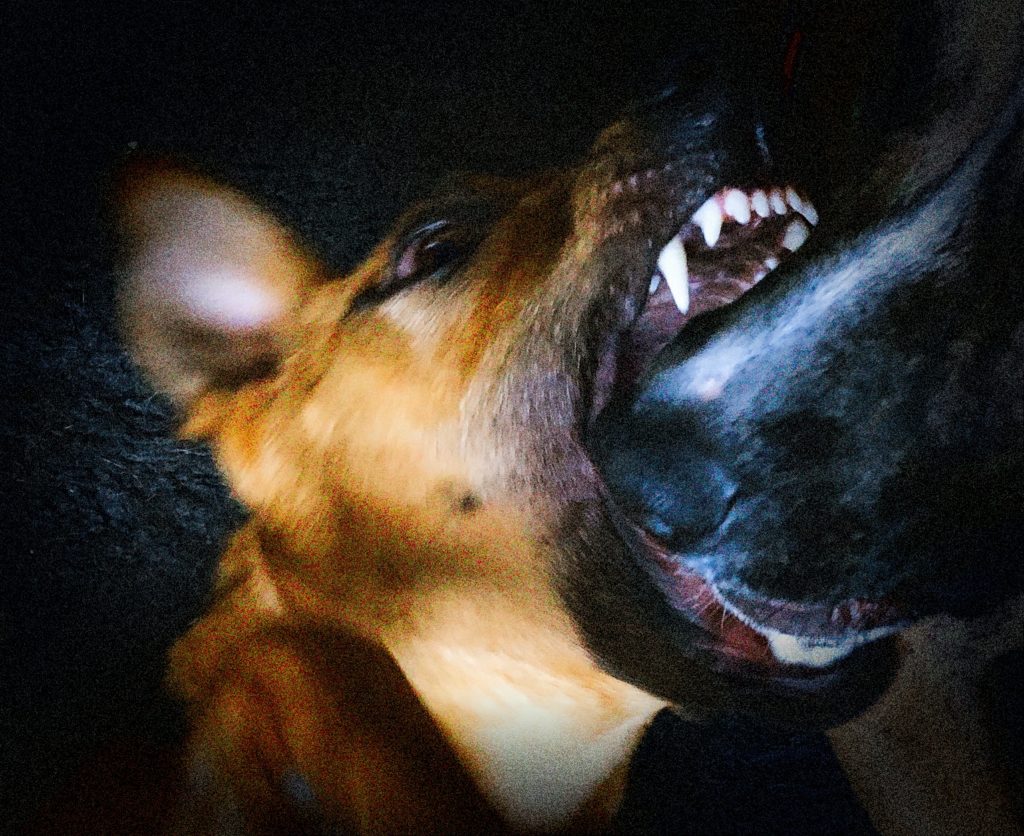Medication
by Eric Buechel
Jesse was staring down at her when I walked into the room. His face looked puffy like he’d been crying. He leaned down, kissed his mother on the cheek, and whispered something I couldn’t hear.
A picture of the two of them hung on a thin nail in the bedroom. His mom was wearing a white dress with tiny yellow tulips in the embroidery, holding Jesse’s hand. He was probably five or six in the picture, but I never asked about it since I didn’t want to upset him. It looked like they were at an Easter egg hunt at a church.
The machines hummed. It reminded me of listening to the waves at the beach when I was younger. Monitors beeped and pulsed around the body, lighting up the bedroom. They diagnosed Jesse’s mom before I had met him in the seventh grade. When she stopped speaking or walking, they put her in a homecare bed to wait until she died. The room smelled sweet, like the bandages needed cleaning. It was a kind of smell you only know about when you’re around rotten skin.
Jesse and I had been close for a while. My dad had died when I was eight, so it felt like we had something in common. My mom had a boyfriend right after Dad died. He was some type of artist. He built sculptures out of trash in the backyard, and I helped him pick out the right pieces from the neighbor’s garbage can. He let me sip his beer while I handed him cans and broken furniture bits that he balanced and fixed together with twine.
“I can’t believe people toss this gold,” he’d say, marveling at the variety of artistic supplies he could scrounge. Sometimes, he snuck me R-rated movies to watch on the weekends that I wasn’t allowed to see. I still carried the pocket knife with me that he gave me for my 12th birthday. A few weeks later, he asked for it back while he was drunk, but I told him I lost it at the park. I liked him. He had another girlfriend in Seattle the whole time, and after my mom got pregnant with my sister, he moved away to live with her.
Jesse put his hands underneath his mother’s torso and lifted her, rolling her over onto her side so the bedsores could breathe. She had that absent look in her eyes like she was looking at a car crash that had just happened and didn’t quite know how to react to it yet.
Jesse put his face in his hand for a second and looked like he might be crying. I wanted to reach over and put my arm around him. I looked at his long hands and thought about holding one of them in mine for a while. It doesn’t have to mean anything about me, really, I thought. It could just be something friends do.
I pushed that feeling out of my mind, terrified at what it might signify, and clenched my jaw slightly. Jesse was just rubbing his eyes. He sighed a little, then looked over at me and gestured with his head at the medicine shelf.
The insurance sent the money to her boyfriend, Marty, who lived in the master bedroom. He spent a lot of time with his new girlfriend, drinking in the kitchen. Whatever homecare he did for Jesse’s mom, I never saw it happen. He seemed too angry to be a nurse, but most adults seemed angry to me then.
The shelf had stacks of prescription pill bottles neatly arranged on it. We looked through them to see if there was any left to steal. We each picked up the different containers and shook them, hoping for a rattle, but they were all empty except for a stool softener and a blood pressure medication.
“She’s supposed to get a new prescription delivered sometime soon, I guess,” Jesse said. I don’t think Jesse felt good about it, but his mom hadn’t spoken in so long that he probably just wanted to get high to forget about her. He told me once he talks to her all the time since she’s his only real family. Marty probably wished Jesse wasn’t around at all. I only ever saw them yelling at each other.
“Let’s go,” I said. Jesse turned around and shut the light off. The glow from the machines made the dark of the room seem possessed.
As we shut the door, we heard Marty’s new Charger pull into the driveway. He’d put on an aftermarket muffler when he got it. It made a loud gurgle that echoed off the garage door while he was in the driveway. Jesse told me that the neighbors had complained about the noise, and then Marty had threatened to break their car’s windows with a golf club. He got pretty wild after his shift at the hospital; so, usually I timed my visits so he wouldn’t be there. We snuck quietly into the kitchen.
“I don’t want you to be bringing people in that room,” Marty said, catching us just as we made it to the sliding glass door to the backyard. He slurred a bit. His red hair was unkempt and pointed in different directions, making him look like a broken clown.
“It’s just Gabe,” Jesse said.
“I don’t care who it is,” Marty said. “Did you check the mail today?”
“No. I mean, I did, but it didn’t come yet,” Jesse said while he inched us closer to the door.
“Shit.” He looked tired with his nurse scrubs dirty and covered in wrinkles. The hospital shift must’ve been busy. He opened the freezer and brought out some vodka with ice caked around the bottom of the bottle. “I know you’ve been stealing those pills.” He poured the liquor into a small, blue-colored plastic tumbler. She needs them, not you, you little bastard.” Jesse didn’t respond. Marty got a big jug of cranberry juice out of the refrigerator for his cocktail. On the fridge door was a picture of girlfriend Alexis that he must’ve recently put up.
“What the hell’s that up for?” Jesse said.
Marty stirred the drink with his finger then licked it clean. He stared back at us. His eyes were glassy, and I knew we had to leave.
Jesse got as mad as Marty sometimes, almost like they were related, and I could tell then he wanted to scream. I took his arm and led him outside before Marty could hit him. We walked out and grabbed the bikes in the grass of the backyard. I tried to catch Jesse’s eyes to tell what he was thinking, but he wouldn’t look at me.
Some of the trees were already beginning to shed. Our bikes left a divot in the thin pile of leaves as we rode past the boundary that separates the east side of town from the west. Susan’s ice cream stand was open until dark, which still gave us some time. I looked up along the hillside and the bridge where cables of light came through the smatter of dark clouds, brightening up the golden edges of maple leaves as they turned yellow. I could feel the first real edge of cold in the air. It burned on the low end of my breath when I took a deeper one.
Jesse rode ahead of me like he usually did, leaning back on the bike’s seat and coasting casually down the hill. When he was far enough in front, he took his feet off the pedals and spread them out in a V shape. I pumped in a low gear, trying to catch up, but he was older than me and encouraged with the ropy muscles adolescence had thrust on him overnight. As I finally inched closer, I could see he was smiling in the breeze of the ride. When he smiled, his cheeks bunched up around the speckles of acne scars. They were healing purple craters all down from his temple to chin. I couldn’t help but smile too. I know everyone thinks you should be ashamed of scars like that, but I always thought they looked nice on Jesse. He had a happy face, even if his life at home wasn’t any good.
Mine wasn’t good either, but I guess that’s the age we were. Looking at the other kids in our class, by comparison, made me clench my teeth, but I don’t know if their life was any happier than Jesse’s or mine. It just looked that way.
Once the hill curved back up, we pushed back into our pedals and towards the bridge where the tents were. Ever since I could remember, the parking lot near the bridge’s underbelly had been a campsite for the homeless people in town. Faded blue and red second-hand tents formed a makeshift village. Scattered trash and panhandling signs had spilled into the street near the camp. We weaved around the plastic cups, plastic bags, and broken needles, then up towards Susan’s.
Jesse got a blackberry milkshake, which I decided against since my mom always told me that the fruit flavors were all artificial, and I got a butterscotch one with a scoop of peanut butter mixed in for fifty cents extra. We walked our bikes and shakes to the curb and sat where we could oversee the parking lot. The shakes were too thick to pull through a straw, so we waited for them to melt. Jesse took the top off and poked at the ice cream with his finger to get it to thaw quicker.
A man was picking up cigarettes on the other end of the parking lot. He pinched them and poured the tobacco out in tiny flakes into a plastic shopping bag. He was shaking a bit; he looked sick with something.
“Hell,” Jesse said,” taking a labored sip from his shake,” I feel kinda bad for him. I should just give him one, huh?”
“Where’d you get smokes?” I said, my ears tingled a little.
“Marty had them, only have three.”
When Marty was drinking, Jesse would sometimes pocket a few of his cigarettes. Marty usually just figured he’d smoked them himself unless Jesse got greedy and took the whole pack.
“Here,” Jesse handed me one and walked over to the man.
I lit mine immediately and took a drag before taking a sip of my shake. The salt and the sweet, all mixed in with the taste of smoke, gave me a quick headrush that felt nice. I kicked a couple of brown and golden leaves next to my feet that were piling up and rotting in the parking lot. It was too cold for ice cream, but I was still warm from the ride, my sweat cooling the fabric on the back of my shirt. Jesse handed the guy a cigarette. The man tore off the filter and lit it right away with a book of matches. I could see them talking about something, but I was too light-headed and enjoying myself to care. For a moment, I felt content. They walked back over. Jesse was grinning with his cheeks all wrinkled up with scars.
“Gabe, this Isaac,” he pointed at the man, “Isaac said he’ll buy us beer. What kind of cash you got?” I had exactly six dollars. Jesse, for some reason, had ten.
“Perfect,” Jesse said as I handed him the money. The bills were damp from my sweat since I didn’t have a wallet, and I felt embarrassed about it. Jesse didn’t seem to notice. He smoothed the bills flat in his hand, stacked them up, licked his finger as if imitating a serious checker at the bank, and counted them out. He handed the stack to Isaac, who put it in his pocket without counting them.
“Gotta go get my ID,” he said. He was looking past us when he said it like he was staring at something further off.
“Why do you need that?” I said, “no one’s gonna ID you.” He looked like he was fifty years old. I looked at Jesse, who shrugged it off. Isaac turned and walked towards the bridge. We followed, walking our bikes. I figured the money was gone.
We walked past the sifting swoop sounds of rush hour traffic and down the hill. After about a half-mile, before the bridge, Isaac turned left and pushed through a thick patch of blackberry bramble and pine branches, then disappeared. I tried to catch Jesse’s eyes.
“He said he could get pills too, Jesse hissed, following Isaac through the branches. I waited for a second, then decided I might as well follow. I didn’t have to be home for a few more hours. I took one last sip of my shake and left the still half-full cup on the concrete, hoisted my bike up over my shoulder, and wobbled in. Bramble vines stuck in the spokes, and the ground was too soft and wet to balance on. I fell forward and onto a pathway that was so well maintained and smooth it looked like it should be in a park near a mansion.
The ends of branches were tied up at their tips, forming a lattice above us that made me feel like I was walking through a portal to a lush garden. Bits of trash, woven together in little stick figures and dream catchers, hung from all over. Chunks from a tin can, cut up with a serrated knife to look like tinsel, reflected bits of the light it could catch in tiny flashes of pure white.
Isaac plodded along in front of us, muttering to himself words I couldn’t understand besides the curses. The path winded downwards and finally opened up to the sky near the water, where we could see the bridge’s backside. It was an angle I had never seen, and I realized the camp spread out much further from what I had imagined it did from everyone else’s view on the side of the road. The whole of it seemed to stretch for miles.
Old cardboard boxes lined the path, so pushing my bike was smoother even though it was still wet from the rain.
“Mindy’s got my ID,” Isaac said, breaking up his incomprehensible mutter. “We gotta go see Mindy.”
He curved into the camp, which I now saw was more than just used tents and tarps. Pallets were stacked to build castle-like barriers from one dwelling to the next. Repurposed appliances lined the pathways like futuristic cobblestones. Camp stoves and tiny firepits glowed in dwelling areas where people cooked. Shopping carts were all over. I had never seen so many. They carried people’s belongings, acting as a dresser or a car for some people. Each one had its unique pile of junk in it. One of them had piles and piles of bike parts. Another was full of what looked like old groceries left too long in the sun. A man turned a hunk of meat on a spit over the crackle of flame in an old coffee can. I watched him throw the plastic wrapper in the heat and heard it crinkle.
This Mindy was mending a rip in her pants with a spool of cinnamon dental floss. You could see the criss-cross pattern of red where she’d already gone over. It looked sturdy enough. She sat next to an old pitbull with markings on it like a brown and white spotted cow. It wagged its tail a little when we got close. Otherwise, it looked nailed down to the cardboard, too exhausted to attempt a sniff at our pant legs.
“Need my ID,” Isaac said to Mindy. She looked up at him for a second without talking, like they were communicating through thoughts. Then she got up and walked off further into the camp. The dog leaped up like it touched an electric fence and trotted off behind her with a grin on its face, its pink gums full of drool dripping onto the cardboard on the ground.
“Wait a few minutes,” Isaac said, not addressing Jesse or me directly. “Doc’s coming soon.” He lay down on some paper and curled his knees under his arms. I could hear him swearing. He started to shiver so hard I thought he might be having a seizure. I touched his shoulder and tried to get him to turn over, but he rolled away from me and moaned.
“What guy?” asked Jesse. Isaac didn’t answer. He pushed his forehead into the dirt and made a high-pitched sound.
It was twilight by then. The autumn light was darkening quickly, and I was starting just to wish I wasn’t there.
Mindy came back with Isaac’s tattered ID card. Her dog chased a Shepard pup away, nipping at its tail. They circled each other, growled then sped off into the camp like they were friends. Mindy laughed at it and didn’t seem to think Isaac on the ground was anything much to be concerned over. She saw I was scared and put her hand on my shoulder.
“S’alright hon, he’s just getting sick without his meds. The doc will be here soon. He’ll be okay.”
“What’s wrong with him?” Jesse asked.
“Just dope sick,” Mindy said. “He needs a bunch of other stuff too, but he doesn’t have ways to get it. Pills will help him calm down.”
We stood and looked at the man, shuddering and clenching his jaw. I felt like I shouldn’t be watching. I looked over at Jesse, and he was facing the other direction, looking at someone coming towards us.
A stringy-looking man with black pools for eyes walked up.
“Are you boys in some kind of bike gang?” he said. He laughed at his joke, and we clung to our bikes a little tighter. He had burn scars up and down his arms that were raised and irritated from scratching.
“Let me see that,” he said as he started to reach for my bike. I stood dumb and unmoving. I thought about the knife in my pocket but knew it wouldn’t help much. He grabbed the handles as I held onto the seat post. I fingered the knife in my pocket, but I was too scared to pull it out.
“Stay back!” Jesse yelled out at him. He was loud but still sounded small. The man wrenched the bike from me and hopped on.
“Ooh wee, this is a nice one,” he said, pedaling around in a circle and smiling. “Real, real nice.”
Jesse dropped his bike and ran towards him, colliding with his whole body weight into the man’s side, knocking him down. He landed with a hollow thud, his arm twisted back behind him, with his teeth in the dirt. Stunned, his big black eyes wide open, he began to howl. Jesse picked up my bike and brought it back over to me. People were looking at us then. A few of them started walking towards the hurt man on the ground. “Shit,” Jesse said. A half-circle of the camp residents began to crowd us.
“Who are you?” somebody yelled out at us. Someone else threw a bottle. It hit the side of my neck and bounced off my bike to the ground. I felt it, but it didn’t hurt then. I looked back at Isaac and realized he was gone. Looking past the crowd, I could see him headed towards a man parked in a car that looked sort of familiar.
“Isaac!” I called out after him, but he was too far off to hear us. A couple of the people turned around and saw who it was.
“Doc’s here,” I heard a few of them say. They began to peel off, one or two at a time, and head towards them.
We ran, wheeling our bikes fast over the lumpy ground. We took a route up the side of the bridge that was steep but passable. Looking back, I could see the group crowded around the car that had driven to the side of the camp. I felt a tingling feeling that went from the base of my spine to somewhere in my forehead, where it settled. Marty’s red hair was visible from this distance. He passed small bags of something to the men and women that swarmed around his vehicle, exchanging them for wads of dirty bills.
“What’s he doing here,” Jesse said, “let’s go before he sees us, c’mon.” he pulled at the back of my shoulder.
“He’s selling something,” I said. Then a sinking feeling came over us both, knowing that we’d lost our money.
“We could wait for a bit, then go try and get the cash,” Jesse said.
“It’s gone, man,” I said.
Back at Jesse’s, Marty’s girlfriend was watching television on the couch and smoking a cigarette. We walked past her without saying anything. In the kitchen, Jesse grabbed the garbage lid off and started digging out the insides. He pulled out some empty microwave dinner packets and fast food bags, then he found it. A white prescription bag, with his mom’s name on it and today’s date, crumpled up and empty.
Jesse looked down at the bag and wrinkled up his face, then threw it on the floor with the rest of the trash and walked towards his mom’s room.
He turned his mom back up and over, finishing his chore for the day. She groaned. It sounded like it came from somewhere far off, like the third echo down a canyon in an old cartoon.
“Mom?” he said down into her face, “Mom, can you talk?”
But she couldn’t.
I wanted to stay, but I had to be home. Jesse’s face was puffy, and he looked older, like in his twenties already. Marty’s girlfriend laughed at something on the television in the other room. I said goodbye to Jesse, but he didn’t say it back.
“I’ll see you at school tomorrow,” I said. I looked at Jesse’s shoulders, skinny in his thin shirt, and wished I could wrap my arms around them. “Love you, man.” He didn’t turn around.
I left. I didn’t know what else there was to do. If I didn’t get home by ten, my mom would drunkenly call the cops. It’d happened before. I went outside alone and picked up my bike. I felt a bad feeling all over like something was going to happen that I didn’t want to, but I couldn’t help. It moved around my chest like something had burrowed there that shouldn’t have. The streetlights were on, I could hear the buzz in the cold, and for a moment, I watched a couple of moths bump into each other near the glow. The Charger pulled in just as I walked off the driveway. I ducked behind the neighbor’s rotten fence and held my breath while Marty walked inside. The car’s engine clicked and tittered as it cooled. I sat for a moment, thinking, then got up and took out my knife. It felt heavier than it should in my hand as I pushed the blade’s tip into the tire’s center bulge. At first, nothing happened, but I worked it in until it punctured. Rubber-thick air gushed into the night until the rim touched the driveway.
I pushed down hard on my bike pedals towards home. The wind stung the skin under my eyes, and I wished I was drunk or asleep. Maybe someplace far off and away from anybody. The street lights flickered dimly, just barely light enough for me to see the road.
Eric Buechel is a writer from the Pacific Northwest. He has a BA in Psychology from The Evergreen State College and an MFA in Creative Writing from Sarah Lawrence College, where he was the fiction editor for Lumina and taught in the Right to Write program through Westchester County Corrections. He works as an editor and English tutor.

